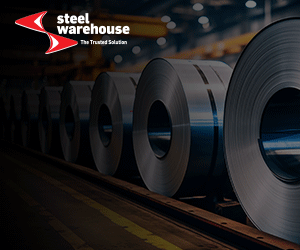BOUND ONLY BY IMAGINATION (Part Three)
Our series concludes with landscape design fabricator Kris Kesler of Bobé Water & Fire Features moves to fabrication, where fittings are machined, materials are cut using both CNC Plasma and water jets, and the silicon bronze and stainless steel piece is fully TIG welded.
Posted: April 8, 2010
In this final stage of our series, fabricator Kris Kesler packs away his computer and fires up his welding torch as his custom waterfall fireplace finally hits the fabrication floor.
?THE PROOF?S IN THE PLUMBING?
?It?s crunch time,? Kesler says as he watches a flatbed crane swing 300-plus lb of metal through the azure Arizona sky. ?Which may be a poor choice of words,? he adds quickly. Nervously tapping his foot, he leans this way and that, looking for the slightest sign that the load is shifting, or worse, warping as it?s hoisted over a wall and dropped into place.
A few stressful minutes later, the rectangular load is safely resting atop its new home, a sunken, pre-plumbed concrete plinth extending off the client?s backyard patio. After confirming that the four-foot-high by five ft wide fountain is level, the stainless steel gas, plumbing and air lines rising up from the concrete pad are quickly connected to their respective inlets and outlets on the structure?s side. (After installation, these connections, as well as the aluminum water reservoir lining the base of the fountain will be buried under a second layer of concrete that will itself be hidden under a layer of grass.
Within minutes, the external water pumps are turned on and the large aluminum reservoir, or sump, gurgles as it fills. Meanwhile, Kesler starts fidgeting with the wireless remote that controls the fireplace?s electronic ignition device. Nodding toward the clients, a husband and wife beaming with joy at their new baby, he mumbles, ?Everything looks good so far, but the proof?s in the plumbing.?
HAMMER TIME
Based out of a 20,000 sq ft fabrication facility in Phoenix, AZ, Kesler is the driving force at Bobé Water & Fire Features. Specializing in the design and fabrication of high-tech copper and stainless steel landscape design features, Bobé?s (pronounced BO-BAY) products have been installed everywhere from Bermuda to Dubai. However, it was a call from a homeowner back in Phoenix that led to Kesler?s latest creation ? a freestanding, double-sided fireplace where the entire structure is bathed in flowing water.
Designed with SolidWorks 3D CAD software, this custom fire and water feature was fabricated over the course of two weeks by Kesler and his floor manager, Jason Wrobleski. Constructed with a mix of stainless steel, aluminum and COR-TEN, or weathered steel, the interior space of freestanding fire-fountain is also jam-packed with a complex matrix of stainless steel pipes, valves and baffles. However, the most important materials used in the fabrication of this metal structure are a couple of ounces of plastic, silicone and precious metals, aka the portable compact flash card containing the step-by-step assembly instructions that Kesler hands off to Wrobleski.
?Normally, I?d waste a lot of time punching numbers into the shear,? Wrobleski says as he loads another sheet of 316 stainless steel into the bed of a computer numeric control (CNC) plasma cutter. ?But this new SolidWorks software does that stuff for me. It even analyzes how to arrange and cut each piece to get the most out of each panel.? Further simplifying matters, each piece is individually scribed by the plasma cutter with a brief description, so there?s no confusion of flipping of mirrored pieces. That said, this heavily-tattooed metalworker, who handcrafts custom choppers in his spare time, is still a little distrustful of computers. ?I don?t care what the computer says, I?m not satisfied until I?ve measured each piece by hand,? Wrobleski says.
Now that each piece has been cut, measured and deburred, it?s time to break out the hand torches. ?I prefer to use TIG welding exclusively versus MIG welding,? Kesler says. ?It?s a slower process, and doesn?t automatically create the pleasant ?roll of quarters? look like MIG welding, but to me, there?s more artistry to it.? More important, Kesler says, the smaller, pen-like welding tip allows pinpoint accuracy, while the lack of spatter allows him to visually control the welding process better. Finally, the slower speed allows gasses and impurities to escape the welding puddle before it solidifies, creating a stronger bond.
Assembly starts with the bottom trough, which rests right above the aluminum water sump and will house the propane burner and electrical igniter. Piece by piece, the components are tack welded together before Kesler follows up with a full arc weld. ?When you?re working with an outdoor water and fire feature, you really have to add a tack every half-inch,? Kesler says. ?Metal has memory, and when you add heat to try to fuse the panels together, the pieces tend to pull apart. And if you don?t get the first weld just perfect and correctly angled, you?ll be behind the eight ball throughout the project, using vices and hammers to try to get the parts to line up flush.?
After the base trough is completed, Kelser adds the massive COR-TEN panels that make up the front and back of the piece, as well as frame the large fire window. ?Clients really like that rusted metal look,? Kesler says, ?so we used COR-TEN panels which will rust up to a certain point but then stabilize and not rust through.? He also switches to a silicon-bronze welding rod, both for aesthetics purposes and to make sure the weld will not affect the material?s protective coating of stabilized rust.
Next, Kesler builds out the interior walls of the fire window, which turn out to be the most difficult part of construction. ?It?s tough to get the metal to hold in place and get a clean-looking yet sturdy weld,? he says as he and Wrobleski flip the ever-growing structure yet again searching for a better angle. ?I really don?t want to have to start hammering away here.?
Finally satisfied, the piece is stood upright so the three upper water troughs and baffling systems can be added, before the whole structure is topped with a stainless steel grate. Sandwiched between the two COR-TEN facades, this section will be covered in flowing water once the fountain is turned on, so it?s the only part of the exterior made from stainless steel. ?COR-TEN steel is not rustproof, especially in standing water, so the entire middle of the fountain is made with 316 stainless steel panels welded with a 316 stainless steel rod,? Kesler says. Meanwhile, the sump base was built out of aluminum, not only to lighten the overall weight of the fountain, but because it?s strong enough to resist buckling and dissipates heat very quickly.
Finally, the entire piece was flipped upside down again so all plumbing and mechanicals could be added to both sides. A thin metal grate was also added to the bottom of the fire window to hold up the layer of decorative tumbled glass. After a few trial runs, the entire feature was packed and loaded onto the bed of a pickup truck.
NO LOOKING BACK
Back in the backyard, Kesler turns on the pumps and grimaces as the gushing water flow is marred with hundreds of tiny bubbles. However, after the initial flood, the flow settles and the water transforms into perfect glass-like sheets. He clicks the remote ignition device, and watches as the propane flames erupt out of the glass in a single uniform row.
Looking relieved, he says, ?Years ago, I started out as a strictly hands-on manufacturer and fabricator. Now the process is 100 percent precise. And frankly, I don?t miss the old way of doing things.?
– – – – – – – – – – – – – – – – – – – – – – – – – – – – – – – – – – – – – – – – –
Bobé Water & Fire Features, 3101 N. 29th Avenue Phoenix, AZ 85017, 602-253-3494, Fax: 602-253-3496, www.bobescuppers.com.














